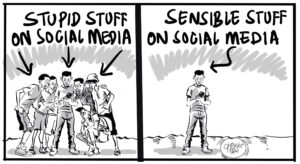Since the country attained Independence in 1964, the country today has three(3) Former Ruling Parties (FRPs). These are the United National Independence Party (UNIP), the Movement for Multiparty Democracy (MMD) and the Patriotic Front (PF).
UNIP ruled Zambia from the time of Independence in 1964 to 1991, a total of twenty-seven (27) years.After the 1991 general elections, which took place on 31 October 1991, the party came out with only twenty-five (25) out of one hundred and fifty (150)elected Members of Parliament (MPs).
In 1991, UNIP lost power to the MMD. Today, 30 years later, UNIP does not have a single MP. The question is: WHY?
The MMD ruled the country for twenty (20) years, from 1991 to 2011. After the 2011 elections, which took place on 20 September 2011, the party came out with only fifty-five (55) out of one hundred and fifty (150) elected MPs.
In 2011, the MMD lost power to the PF. Today, 10 years later, the MMD does not have a single MP. The question is: WHY?
The PF ruled the country for 10 years, from 2011 to 2021. After the 2021 elections, which took place on 12 August 2021, the party came out with only sixty (60) MPs out of 156 elected MPs.
The PF has just lost power to the UPND Alliance. Already there are signs that in the next 10 years the PF may not have a single MP. The question is: WHY?
There must be something terribly wrong with the way these ruling parties conduct themselves after losing power. In fact what we see is that members of political parties that lose power immediately “jump ship”. They defect to the ruling party. The question is: WHY?
Political parties are supposed to have ideologies, which express what they stand for, which express what they are all about.
Political parties are supposed to use their ideologies to attract people to join them as members. And it should be the political parties that should attract the electorate to vote for them at the time of elections.
If members of political parties belong to those parties on the basis of the ideologies of the parties, why do they defect to another party after their party has lost elections?
The behaviour of party members to defect to the ruling party says a lot about their purpose of belonging to any political party. Their interest is not the interest of the party but their personal interest.
What is the meaning of this?
It means that political parties have wrong people as members.
It means that those members are not patriotic about their political party. It means that they do not actually believe in what the party stands for.
Wait a minute! Did I say that the members do not actually believe in what their political party stands for?
Maybe it is not the members who have a problem. Maybe it is the political parties thatare a problem. Maybe the political parties have no ideologies. Maybe the political parties do not have what they stand for.
Wait a minute! Did I say maybe it is the political parties that are a proble?
I think it is both the political parties and the members that are a problem. How do people decide to come together as a political party without defining what they should stand for?
There is need to reconstruct the way political parties are formed. There is need to reconstruct the purposes for which political parties are formed. There is also need to reconstruct the purposes for which people join as members of political parties.
The three former ruling parties should lead the way in helping the country strengthen the way political parties and their members behave once they come out of power.
Since UNIP, MMD and the PF have one thing in common, that is, being Former Ruling Parties, they should convene together as one and do a post-mortem of the 1991, 2011, and 2021 elections.
They should begin by asking themselves WHY they lost power in 1991, in 2011 and in 2021.
They should then ask themselves why they become WEAK political parties after they leave office.
They should then look at everything they have in common as the three former ruling parties. They should examine together their ideologies. They should examine together what they stand for as political parties.
They should then look at what differentiates them from one another as political parties. They should examine the fundamental differences of their political parties. They should then begin to work towards harmonising those differences.
They should finally ask themselves what they should do in order for them to become strong political parties again.
A naked reality is that the prospects of any one of them becoming a strong political party again, as it were while in power, are very remote. And the following are the reasons:
– Selfishness: the leaders and members of these political parties are more interested in what they should take out of the party and not what they should put into the party;
– Fights for leadership positions: we are already seeing what is happening in the immediate past ruling party, the PF. These fights for leadership are going to weaken the party further;
– Personality “cults”:these political parties rarely espouse what the party stands for. The party principles are subservient to an “almighty” leader. The identity of the party revolves around the leader;
– Lack of communication: the leaders and members in these political parties seem to be talking to one another, but in actual fact they do not communicate. They do not listen to one another;
– Dishonesty and the lack of trust:the leaders and members in these political parties do not seemto trust one another. They have no faith in one another. They are not honest to one another;
– Lack of resources: this is a big one. While in power, the MMD and the PF were not investing for the party. They were investing for individual selves. Consequently, their financial base is very WEAK. While UNIP had investments and capital infrastructure, some of which are still standing, the party has failed to manage them for the benefit of the party.
With all these weaknesses, the chances for the redemption of any of the three Former Ruling Parties are extremely remote.
However,they still have chance of “rebranding” to become STRONG parties again if they embrace the following:
– Patriotism for their parties: They should have leaders and members who are whole-heartedly devoted to the political party. They should have leaders and members who vigorously and unquestionably support the party;
– Embracing the party and its values: Leaders and members should be holding the party “closely in their arms”, as an affection to the political party.
– Togetherness and fraternity: all the members of a political party should havea sense of belonging together. This senseshould also be manifested to the outsiders who are not members of the political party so that they are attracted to join.
– A deep sense of sharing:In this sense what belongs to the political party belongs to all. No one should claim it to be personal, and no one should personalise anything that belongs to the political party.
Maybe it is time to begin to think about the creation of an Alliance of Former Ruling Parties.
Remember, what we have now is the UPND Alliance in government. It may have to take another strong Alliance to provide credible and relevant checks and balances on an Alliance Government.
Since Zambia is a multi-party democracy, there is need for strong institutions that should promote and enhance multi-party democracy and good governance. One such institution is political parties.
About the author: Simon Kalolo Kabanda is a Human Rights and Development Consultant. He is also an analyst ofgovernance
and socio-political developments
(If you have any socio-political question that you would like to be discussed on this column, kindly send a message to me either through sms, WhatsApp or email).
Whatsapp: +260-761-206353
Email: [email protected]




















One Response
The former ruling parties were intertained corruption when they in power. Now, no one can trust them with power again.